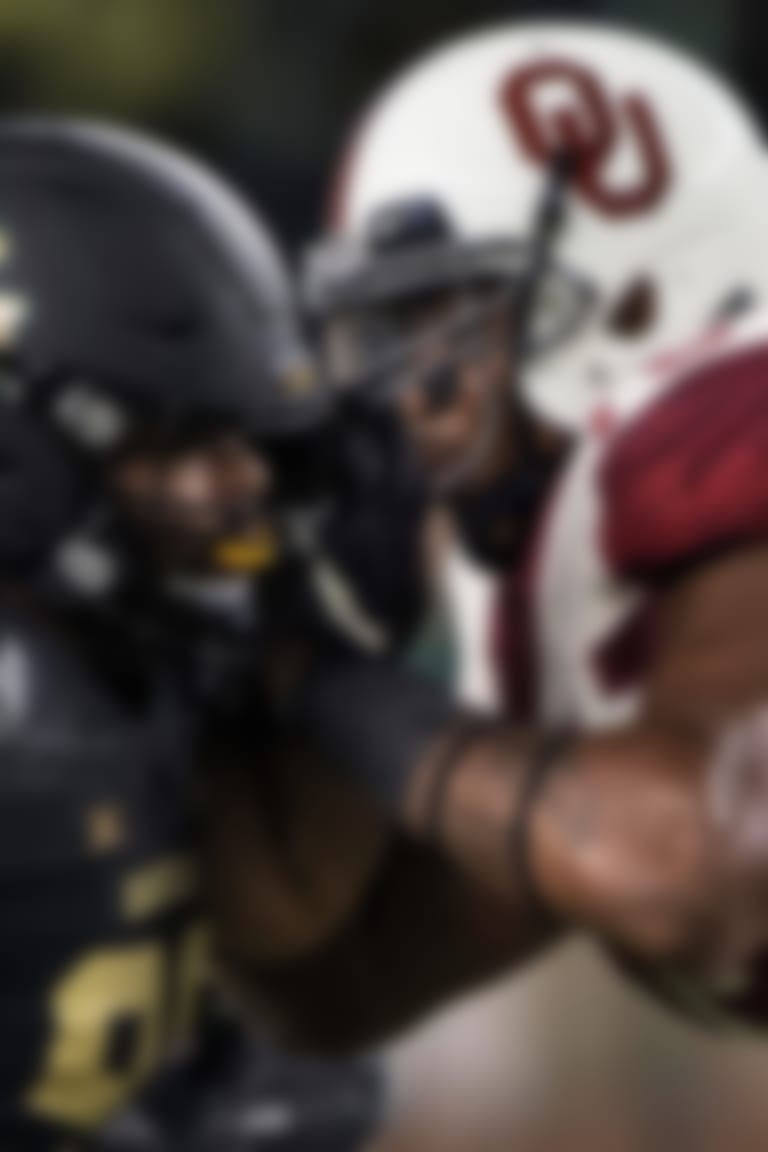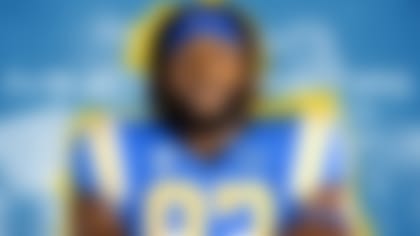His NFL father's premature death, weight issues, and a colossal combine embarrassment have taught Oklahoma OT Orlando Brown Jr. about the rewards of perseverance
By Jeffri Chadiha | Published April 18, 2018
NORMAN, Okla. -- As soon as Oklahoma's pro day concluded, a crowd of reporters raced to the middle of the school's indoor practice facility, eager to meet with former Sooners star quarterback Baker Mayfield. Thirty yards away, a towering 21-year-old with wireless headphones covering his ears gathered his belongings and quietly strolled toward the door, confident he had answered some questions of his own.
If Orlando Brown Jr. felt any pressure leading into that event a month ago, he definitely appeared carefree after it. He stopped to fist-bump a couple teammates, waved at a handful of students that helped staff the workout, then stepped outside to joke and laugh with his agents under a nearby tree.
Brown had good reason to feel relieved about his pro day. He had entered it as a walking punch line, the player who had performed so poorly at the NFL Scouting Combine that many talent evaluators believed he had obliterated his chances of becoming a first-round pick. The numbers were so abysmal -- he tested last among all participating offensive linemen in several categories, including an effort on the bench press that ended with him pumping out just 14 repetitions of 225 pounds -- that even he joked he had to avoid Twitter for a few days. However, after producing 18 reps on the bench and running a faster 40-yard dash (5.68 seconds compared to 5.85 in Indianapolis), Brown had regained a decent measure of respectability back on campus.
Mayfield, the 2017 Heisman Trophy winner, was the main attraction of that pro day, but Brown was the player who provided the biggest statement: Don't ever count him out. He has learned more than a few tricks about handling adversity, from the days when his weight ballooned to over 400 pounds to the devastation he felt after his father's sudden death in 2011.
"I didn't look at (the Combine) from a pity standpoint because I know I've been down before," Brown said. "At the end of the day, we're talking about football. I know measurables will be used to compare me to other prospects and I respect that. But once people watch my film, they will see what I'm capable of. I may only be an 18-rep bench-press guy but I move people on the field and I push them around."
Brown's optimism comes from a simple place. Football always has been in his blood and, with that being the case, his destiny. His father, Orlando Brown Sr., spent 10 years in the NFL as an offensive tackle. Brown's dad is most notoriously remembered for his 1999 season with the Cleveland Browns, when referee Jeff Triplette threw a penalty flag that smacked Orlando Sr. in the right eye and nearly ended the player's career. Orlando Sr. also earned one of the best nickname's in NFL history -- Zeus -- because of his mammoth 6-foot-7, 360-pound frame.
As a unanimous All-American in 2017 and the Big-12 Offensive Lineman of the Year his last two seasons in Norman, Orlando Jr. already has made quite the name for himself at the college level. The larger question surrounding him has always revolved around how he handles his body. If he manages his weight and continues to refine his craft, he'll become more agile and capable of enjoying a productive career. If he can't, then the jokes that followed his combine performance certainly will multiply exponentially.
Even during Brown's pro day, it was apparent NFL decision-makers see him more as a player whose greatest upside comes from the fact he's so young (he turns 22 on May 2) and that he's still growing into his body. When asked about Brown's pro day performance, one AFC scout said, "He did better. I honestly don't even know how much stock to put into what happened at the combine. If you watch the tape, you see what he can be. The big deal for him is that whether he plays the right side or left side, he needs to show he can handle speed. He will see fast guys on the right side as well."
Another AFC scout added: "I wasn't expecting him to blow it up at the combine. Regardless of what you think of him as an athlete, his size is what sets him apart. He's better suited to be a right tackle but he has a lot going for him. He's smart. He has a good feel for the game, and when he gets his hands on guys, he engulfs them."
That ability to manhandle defenders is something that has distinguished Brown throughout his time at Oklahoma. Mayfield actually laughed off Brown's glacially slow 40-yard dash at the combine, while pointing out that the most important number associated with Brown is the one he posted during Oklahoma's 12-2 season in 2017: zero sacks allowed. Brown also didn't spend much time dwelling on the lost opportunity at the combine.
"I just didn't feel like myself," he said. I started off bad with the bench press and I didn't know how to put it behind me. Once I got away from the things I had practiced (for the bench), the breathing and everything else, then the running went bad. It was tough in the moment."
That honesty surely helped Brown when he met with teams over the last couple months, along with his intelligence and desire. When Brown first arrived as at Oklahoma, Sooners co-offensive coordinator and offensive line coach Bill Bedenbaugh had just been hired from West Virginia. What Bedenbaugh gleaned when he turned on the tape of his new recruit stunned him. All he saw that day was a fat kid who "wasn't very good."
These days Bedenbaugh marvels at Brown's improvement. "From the first day Orlando got here up till now, it's astronomical the leaps he's made," Bedenbaugh said.
"Orlando didn't test this way but he plays strong," the coach added. "He's a smart player. He understands defenses and what the offense is trying to accomplish. He'll ask about coverages. Whatever weaknesses you have, you can overcome them if you understand football. Orlando puts a lot of time into studying the game."













